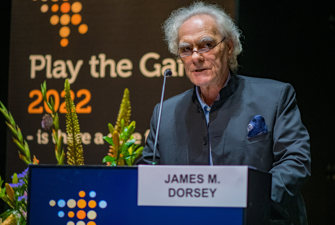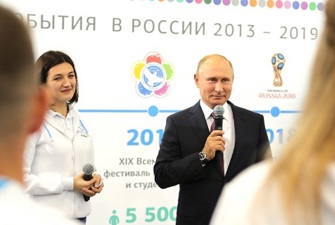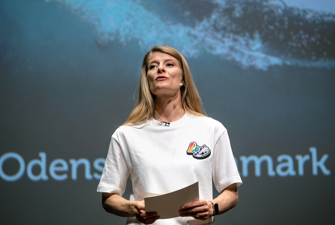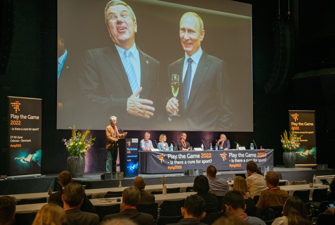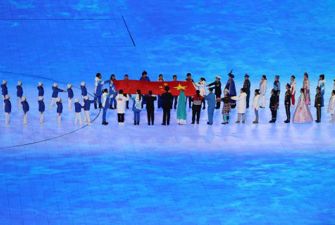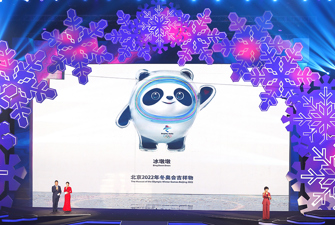The Saudis in sport: Ambitions much larger than sportswashing
In this analysis, senior analyst Stanis Elsborg argues that the term sportswashing simplifies and does not encapsulate the sports policies of many authoritarian regimes. He supports the argument by showing how central sport is in Saudi Arabia’s strategic roadmap ‘Vision 2030’.
Sportswashing is one of the most used words today to describe the political use of sport by nation states. The phenomenon may be as old as sport itself, but the use of the term is relatively new and came to the fore in a press briefing from the organisation ‘Sport for Rights’ ahead of the 2015 European Games in Azerbaijan:
“Azerbaijan is engaged in sportswashing: attempting to distract from its human rights record with prestigious sponsorship and hosting of events including the European Grand Prix 2016, matches in the 2020 European football championship and this month, Olympic spin-off the European Games.”
In 2015, the president of Azerbaijan, Ilham Aliyev (right), invited the European sports world to Baku for the first edition of the European Games. State leaders from all over the world showed up, such as Russian president Vladimir Putin and Turkish president Recep Tayyip Erdoğan. The event was quickly labelled as sportswashing from the organisation ‘Sport for Rights’ due to Azerbaijan’s severe human rights issues. Photo: Harry Engels/Getty Images
Today, the term sportswashing appears widely in international media, and the Language Council of Norway even chose “sportswashing” as their 2021 word of the year defining it as “when governments in authoritarian countries use major sporting events to put themselves in a better light or seek to achieve the same by buying up or sponsoring popular sports clubs.”
It is being used particularly about authoritarian states' businesses and engagements in the world of sport as the definition from the Language Council of Norway also illustrates.
Despite the enormous focus on sportswashing, which may have increased the understanding of sport as a political tool, the use of the term is not unproblematic.
Firstly, there is no broad agreement on how sportswashing should be defined and what it covers, and therefore it is used quite differently by different media and stakeholders in sport.
Secondly, the repeated use of the term by journalists, opinion leaders and politicians gives the impression that only authoritarian political regimes use sport for political purposes, which is far from the truth. More democratic-minded nations also understand the power of sport.
Just look at the 2012 London Olympics and its very political opening ceremony, or at how the United States used sport politically during the Cold War just as their counterpart, the Soviet Union. Both states used sports to create goodwill by convincing the world's populations about who represented the most attractive society – the capitalist West or the socialist East - which in a sporting context translated into who could produce the best athletes.
Thirdly, the concept lacks crucial nuances in the understanding of why many nation states invest massively in the sports world. Using the term sportswashing to the extent that we have seen in the last couple of years simplifies and fails to encapsulate the very sophisticated and nuanced sports policies of many authoritarian regimes. Many of them have been using the sports arena for political purposes for decades and with globalisation and modern-day technology they have only developed this further.
They have differentiated themselves from more democratic-minded nations, and in the last two decades, they have taken advantage of the fact that many democratic state leaders cling to the illusion of a separation of sport and politics. For countries like Russia, China, Qatar, the United Arab Emirates, Belarus, and Saudi Arabia, sport is politics and part of well-orchestrated national strategies.
The relationship between sport and politics may be explained better by drawing on political scientist Joseph Nye's theory of 'soft power' as it provides greater insight into why many states - both democratic and autocratic - invest huge amounts of money in the sporting world.
Sport and the power of attraction
When Joseph Nye started to write about soft power in the 1990s, he expanded the understanding of power and power relations. He developed the concept further in his book 'Soft Power: The Means to Success in World Politics' from 2004 and demonstrated that power does not only consist of traditional elements such as military and economic power, which in Nye's terminology goes under the name 'hard power', but also a power of attraction or so-called soft power.
According to Nye, soft power “is the ability to affect others to obtain the outcome one wants through attraction rather than coercion or payment.” The achievement of this outcome rests on a country’s resources of culture, values, and policies. Joseph Nye emphasises that politics in an information age may ultimately be about whose story wins. Those who tell the best story will gain support and influence, while war and coercion will meet resistance. At the same time, Joseph Nye stresses that a nation achieves the greatest influence by combining hard and soft power in a unified ‘smart power’ strategy.
In the last two to three decades, research into sport and soft power has often had a foreign policy perspective focusing on how sport was used to influence foreign leaders and a foreign audience. However, more recent research argues for the need to include domestic and regional perspectives.
For example, the Russian state under the rule of Vladimir Putin has used the hosting of sporting events in a domestic policy context to influence a new Russian national identity, which has been of high importance for Putin since he came into power in 1999 and above all from his re-election in 2012:
“For us (and I am talking about Russians and Russia), questions about who we are and who we want to be are increasingly prominent in our society (…) the question of finding and strengthening national identity really is fundamental for Russia,” said Putin at the Valdai International Discussion Club in 2013.
A balloon-like St. Basil’s Cathedral was built during the opening ceremony of the 2014 Sochi Winter Olympics – a manifestation of the mutual relationship between church and state in Russia under Putin, and the importance of Russian’s associating themselves with the Russian orthodox church. Photo: Martin Rose / Getty Images
One could argue that sportswashing understood as image laundering is part of a soft power strategy, and of course Saudi Arabia, as a case in point, also wants to use sport to launder its reputation to bolster political legitimacy and not be associated with the brutal murder of Jamal Khashoggi and be seen as a pervasive human rights violator. But for Saudi Arabia, it is not just about improving the image of the country, there is a very important element related to power in the international system – soft power.
There is a danger that with the emergence of sportswashing into the mainstream vernacular and the continued media focus on the sportswashing exercises of authoritarian regimes, we will not understand the magnitude of their political strategies and the exact role of sport in their geopolitical, economic, and societal ambitions.
A soft power strategy is a multifaceted package that focuses not only on sport. but also on music, art, diplomacy, heritage, religion, the film industry, branding, and technology – a complex set of resources. So by including the theory of soft power, we also avoid varieties of words with washing added at the end such as artwashing or musicwashing to describe essentially the same phenomenon.
Soft power is a key part of national strategies in many states
Many nation states and state leaders are very aware of the need of soft power as a part of their policies. For example, in a speech in 2012, Russian president Vladimir Putin stressed that "‘soft power’ is all about promoting one’s interests and policies through persuasion and creating a positive perception of one’s country, based not just on its material achievements but also its spiritual and intellectual heritage.”
In Qatar’s Second National Development Strategy 2018-2022, the importance of a more soft power-orientated strategy is also emphasised:
“The State is committed to constantly promoting dialogue using soft power diplomacy initiatives in regional and international affairs (...) This strategy is based on maintaining good relations with neighbouring countries, forging strategic alliances with major powers and regional and international bodies, and advancing Qatar's image internationally.”
The United Arab Emirates has also launched a new soft power council and soft power strategy in 2017 aiming “to increase the country’s global reputation abroad by highlighting its identity, heritage, culture and contributions of the UAE to the world.”
Manchester City has for many years been the United Arab Emirate’s flagship in its sports strategy. Behind the team’s success is Mansour bin Zayed Al Nahyan, owner of Abu Dhabi’s royal family’s investment company that acquired Manchester City in 2008. Photo: Tom Flathers / Getty Images
Political involvement in the sports world does not always equate to strengthening a nation's soft power. It is a double-edged sword as the enormous exposure that comes with it can also create so much negative publicity that it makes things worse and produce repulsion and loss of appeal or influence.
Nevertheless, the political interest in sport from authoritarian regimes has only increased in the last two decades, and Saudi Arabia in particular has really started to show its strength in the last couple of years.
Appealing to the need to talk about soft power rather than sportswashing is not an attempt to neglect the highly political use of sport by authoritarian regimes and the challenges it gives to the world of sport, or the fact that they try to use sport to mislead and deflect attention away from human rights issues.
On the contrary, it is an attempt to demonstrate how central and important sport has become in the national strategies of these regimes, and that their interest in sport are predominantly political projects that not only focus on image laundering but is an important piece in much bigger strategies.
To illustrate this point, Saudi Arabia is a great example as it presents a clear case of soft power and how sport has become an important component of the country’s strategy.
Sport is a key pillar of Saudi Arabia’s Vision 2030
In spring 2016, Saudi Arabia’s then Deputy Crown Prince Mohammed bin Salman, now Crown Prince and newly elected prime minister, launched Saudi Arabia’s ‘Vision 2030’, a roadmap and an ambitious plan that represents a comprehensive reform process of the Kingdom’s economic, political, and social structures.
The vision covers a lot of projects ranging from a focus on climate change, tourism projects, the creation of a 500 billion dollar futuristic mega-city NEOM over various programmes and initiatives aimed at promoting the country’s culture abroad and the appreciation of its heritage like highlighting the Kingdom’s image as serving the “Two Holy Mosques”, to an ambitious space programme. Soft power in its essence.
Saudi Arabia’s ‘Vision 2030’ consists of a lot of different projects. The ambition of the ‘AlUla Project’ is to create a living museum and a global destination for history, heritage, culture and ecotourism. Sport is also used to promote this as AlUla sponsors cycling team Team Bikeechange-Jayco. Photo: Anadolu Agency / Getty Images
‘Vision 2030’ is of course a part of Saudi Arabia’s wish to attract investors and make political alliances, and the regime is well aware of the need to transform its economic structure in order to reduce its dependence on oil revenue. But as stressed by PhD fellow at the Danish Institute for International Studies, Fannie Agerskou-Madsen, the plan also symbolises a new way of how the regime addresses its youth generation and tries to create a picture of the future Saudi Arabia.
Sport is a key pillar in this strategic framework not least because of its outreach and popularity. Like neighbouring countries Qatar and the United Arab Emirates, the ruling family of Saudi Arabia has realised that sport with its ability to create excitement and national belonging provides a fantastic vehicle for gaining political goodwill, new diplomatic relations, and investments, and therefore sport has become an important political actor for the leaders of Saudi Arabia.
One of the active engines behind ‘Vision 2030’ is the Kingdom’s sovereign wealth fund, the ‘Public Investment Fund’ (PIF), with Mohammed bin Salman as chairman.
In PIF’s programme one of the initiatives aims “to diversify and enrich the Kingdom’s tourism and entertainment experience to build a more vibrant society and solidify the sports sector’s economic and social role on all levels.” Therefore, PIF plays a significant role in Saudi Arabia’s sports strategy not least through various sponsorships in golf, motorsport, and of course the ownership of the Premier League club Newcastle United.
But as already highlighted, sport is far from the only asset that they use to try and exercise their influence. During the 2020 pandemic, PIF invested millions of US dollars in Boeing, Disney, Facebook, and in the United States’ Live Nation Entertainment becoming the third-largest investor. This clearly demonstrates the multifaceted strategy of their Vision 2030, and in the world of sports their investments grow at a fast pace as they acquire hosting rights of international sporting events, buy up clubs, and engage in a wide range of sponsorships.
Saudi Arabia as a powerhouse in sports
With the acquisition of Newcastle United and not least the announcement of LIV Golf International, a breakaway golf series, international media began to really pay attention to Saudi Arabia and its involvement in the world of sports.
Saudi Arabia is a few years behind Qatar and the United Arab Emirates when it comes to including sport as a high priority in their strategic framework but lately, they have started to challenge them in becoming the sports hub of the Middle East.
Saudi Arabia has intensified their hosting of international sporting events in the last couple of years. They will continue this strategy and has already secured the hosting rights of the 2029 Winter Asian Games and the 2034 Asian Games and are competing against India to host the AFC Asian Cup in 2027.
Saudi Arabia has hosted a great number of major international sporting events in recent years as the illustration above shows. From motorsport events such as the prestigious Dakar Rally and Formula One, high profile boxing bouts over several golf tournaments to the Italian and Spanish Super Cup in football, just to name a few. This is not accidental, but part of their carefully planned ‘Vision 2030’ with the intention of presenting Saudi Arabia as a modern nation with a thriving sports entertainment scene.
Just like Qatar, Saudi Arabia also wants the crown jewel in football: the hosting of the World Cup. This ambition could become reality as soon as 2030 as Saudi Arabia is planning to submit a tripartite bid with Egypt and Greece to host the 2030 FIFA World Cup. To support this bid, one of the greatest football players of all time might get a role as Lionel Messi has been revealed as Saudi Arabia’s new tourism ambassador.
FIFA President Infantino (right) attending the heavyweight boxing title fight between Usyk and Joshua at the King Abdullah Sports City Stadium in Jeddah in August 2022. Infantino was not just a visitor in the crowd but sat right next to Crown Prince Mohammed bin Salman (middle), underlining the close ties between the FIFA President and Saudi Arabia. Photo: Anadolu Agency / Getty Images
Since sport and the hosting of sporting events is part of a strategic framework, Saudi Arabia is of course trying to acquire hosting rights for events to take place in the future. Thus, the Kingdom of Saudi Arabia has expressed interest in hosting the Asian Football Confederation’s 2026 Women’s Asian Cup, and in October 2022 Saudi Arabia won a bid to host the 2029 Asian Winter Games and they will also play host for the 2034 Asian Games in Riyadh.
Although Saudi Arabia started a bit later than Qatar and the United Arab Emirates in some sports areas, they have taken the lead in the field of esports. In 2022, the Saudi Arabian state established Savvy Gaming Group and went on to purchase ESL Gaming and FACEIT – two of the largest esports brands - for a reported value of a staggering 1.5 billion US dollars. Saudi Arabia has been very active on the esports scene exemplified by investments in several gaming companies and the hosting of the world’s biggest esports and gaming event, the so-called Gamers8. The investments in the burgeoning esports market is just another example of Saudi Arabia’s expansion in the world of sport.
While football has a global outreach with interest from all ages, the esports scene is dominated by young people which is an attractive target group for Saudi Arabia to exercise their influence and ultimately gaining soft power. Their engagement in the esports area was further cemented when Crown Prince Mohammed bin Salman in September 2022 unveiled a ‘National Gaming and Esports Strategy’ – a new strategic framework for Saudi Arabia’s investments in the gaming and esports sector.
As times goes by, Saudi Arabia keeps adding new layers to its soft power strategy, and they are just getting started. For Saudi Arabia sport is not just sportswashing and a practice of image laundering to gloss over an appalling human rights record – it is about much more: Power in international relations.
This analysis is part of a larger research project conducted by the author. An article with a more detailed description of Saudi Arabia’s investments in sport will soon be published.
Further reading
Nye, J. S. (2004). Soft Power. The Means to Success in World Politics. New York: Public Affairs
Elsborg, S. (2018). Putin's use of sporting events as a domestic policy tool.
Søyland, H. S., & Moriconi, M. (2022). Qatar’s multi-actors sports strategy: Diplomacy, critics and legitimisation. International Area Studies Review, 25(4), 354–374.
